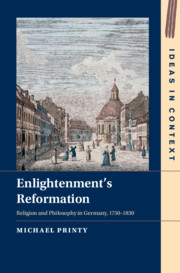Book contents
- Enlightenment’s Reformation
- Ideas In Context
- Enlightenment’s Reformation
- Copyright page
- Dedication
- Contents
- Acknowledgments
- Introduction
- Part I Recasting German Protestantism, 1750–1790
- Chapter 1 The Determination of Man
- Chapter 2 Transitions
- Chapter 3 Enlightenment Theology and the Protestant Public
- Part II Revolutions of the Spirit, 1780–1830
- Epilogue Enlightenment’s Reformation, 1830–1929
- Bibliography
- Index
Chapter 3 - Enlightenment Theology and the Protestant Public
“Neology,” Dogma, and the Perfection of Christianity, 1750–1790
from Part I - Recasting German Protestantism, 1750–1790
Published online by Cambridge University Press: 21 December 2024
- Enlightenment’s Reformation
- Ideas In Context
- Enlightenment’s Reformation
- Copyright page
- Dedication
- Contents
- Acknowledgments
- Introduction
- Part I Recasting German Protestantism, 1750–1790
- Chapter 1 The Determination of Man
- Chapter 2 Transitions
- Chapter 3 Enlightenment Theology and the Protestant Public
- Part II Revolutions of the Spirit, 1780–1830
- Epilogue Enlightenment’s Reformation, 1830–1929
- Bibliography
- Index
Summary
This chapter shows how Enlightenment theology moved beyond its academic and ecclesiastical contexts to become part of a larger campaign for reform. Advocates of a new system of educating and training clergymen turned to the public sphere and cast their project as a continuation of the Reformation. Intended as a rhetorical strategy to solidify support among a Protestant public that was open to a less stringent and dogmatic Christianity than that of Lutheran Orthodoxy or Pietism, Enlightenment theologians paved the way for a fruitful reinterpretation of the Protestant past. The chapter provides an overview of the theological innovations of Halle theologian Johann Salomo Semler (1725–1791), which formed the backbone of much of Enlightenment theology (or “Neology” as it is frequently labeled). The chapter shows how public controversies about binding doctrines led to a series of public assertions that had the rhetorical effect of recasting the historical understanding of the Reformation.
Keywords
- Type
- Chapter
- Information
- Enlightenment's ReformationReligion and Philosophy in Germany, 1750–1830, pp. 91 - 122Publisher: Cambridge University PressPrint publication year: 2024

